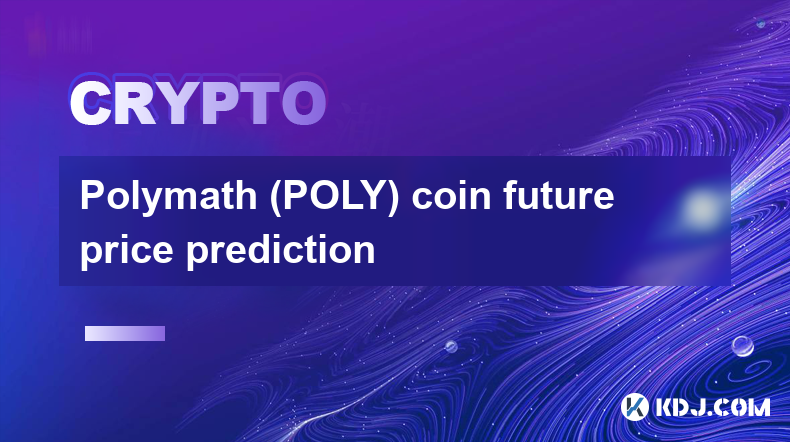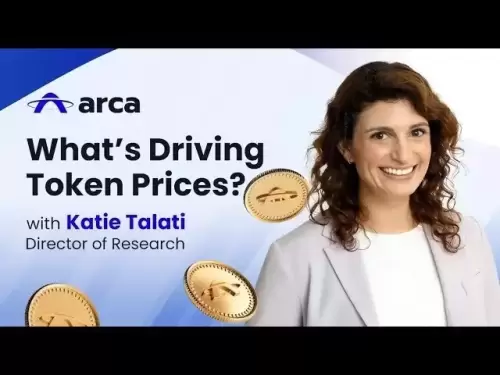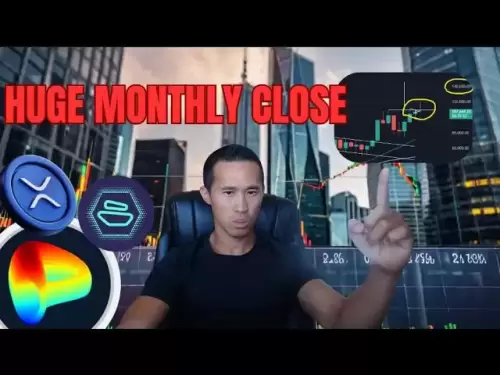-
 Bitcoin
Bitcoin $107,177.4639
-1.14% -
 Ethereum
Ethereum $2,491.2037
-0.61% -
 Tether USDt
Tether USDt $1.0002
0.01% -
 XRP
XRP $2.2429
1.26% -
 BNB
BNB $657.3356
0.28% -
 Solana
Solana $155.4695
1.22% -
 USDC
USDC $0.9999
0.00% -
 TRON
TRON $0.2807
1.56% -
 Dogecoin
Dogecoin $0.1651
-2.72% -
 Cardano
Cardano $0.5729
-1.27% -
 Hyperliquid
Hyperliquid $39.6884
-0.35% -
 Bitcoin Cash
Bitcoin Cash $507.4439
0.67% -
 Sui
Sui $2.7830
-4.69% -
 Chainlink
Chainlink $13.4283
-2.75% -
 UNUS SED LEO
UNUS SED LEO $9.0352
-0.48% -
 Avalanche
Avalanche $17.9622
-4.71% -
 Stellar
Stellar $0.2388
-1.01% -
 Toncoin
Toncoin $2.9152
-0.08% -
 Shiba Inu
Shiba Inu $0.0...01143
-4.04% -
 Litecoin
Litecoin $86.1768
-2.26% -
 Hedera
Hedera $0.1501
-1.98% -
 Monero
Monero $325.6175
4.22% -
 Polkadot
Polkadot $3.4095
-4.60% -
 Dai
Dai $1.0000
0.01% -
 Bitget Token
Bitget Token $4.5457
-1.85% -
 Ethena USDe
Ethena USDe $1.0002
-0.01% -
 Uniswap
Uniswap $7.1505
-3.76% -
 Aave
Aave $275.8099
-0.99% -
 Pepe
Pepe $0.0...09777
-6.00% -
 Pi
Pi $0.5071
-5.03%
Polymath (POLY) coin future price prediction
Polymath's decentralized platform fosters efficient and compliant fundraising, creating new investment opportunities and fostering the growth of digital securities.
Dec 26, 2024 at 02:40 pm

Key Points:
- Polymath (POLY) is a unique blockchain project focused on the issuance and management of digital securities.
- Its decentralized platform allows for efficient and compliant fundraising, creating new investment opportunities for issuers and investors.
- The strength of the Polymath ecosystem, its regulation-friendly approach, and team expertise contribute to its potential for growth.
Detailed Discussion:
1. Understanding Polymath (POLY)
- Polymath is a blockchain-powered platform designed to facilitate the issuance, management, and trading of digital securities.
- It aims to revolutionize capital formation by creating a more accessible, transparent, and efficient market for security tokens.
- POLY is the native token of the Polymath platform, used for transaction fees, governance, and incentivizing stakeholders.
2. Issuance of Digital Securities
- Polymath simplifies the issuance process for businesses, providing a secure and compliant environment for raising capital through digital securities offerings.
- Issuers can define the terms of their offerings, including the security type, tokenomics, and regulatory requirements.
- The platform's legal and technical infrastructure ensures regulatory compliance and adheres to global security regulations.
3. Management of Digital Securities
- Polymath offers a comprehensive suite of tools for managing digital securities throughout their lifecycle.
- Issuers can maintain investor records, distribute dividends, and modify offering parameters as needed.
- Investors have real-time access to their holdings, transaction history, and any relevant updates.
4. Trading of Digital Securities
- The Polymath platform connects issuers and investors, facilitating the trading of digital securities in a secure and regulated environment.
- It supports multiple trading models, including primary issuance, secondary market trading, and OTC transactions.
- Investors benefit from reduced transaction costs, increased liquidity, and enhanced transparency compared to traditional security markets.
5. Regulatory Compliance
- Polymath places a strong emphasis on regulatory compliance, adhering to the most stringent global standards.
- The platform employs a rigorous legal and technical framework to ensure adherence to regulations and protect the interests of all stakeholders.
- This regulation-friendly approach fosters trust and legitimacy within the Polymath ecosystem.
6. Team Expertise and Industry Support
- Polymath is backed by a team of experienced professionals with deep expertise in finance, blockchain, and legal compliance.
- The project has gained recognition and support from industry leaders, including the World Bank and several leading law firms.
- This robust support network enhances the credibility and potential of the Polymath platform.
FAQs:
Q: What factors could affect the future price of Polymath (POLY)?
- Market conditions, regulatory developments, adoption of digital securities, and the overall growth of the blockchain industry.
Q: How does the regulatory environment impact Polymath (POLY)?
- Positive regulations support the growth of the digital securities market and enhance the legitimacy of the Polymath platform.
Q: What are the potential risks associated with Polymath (POLY)?
- Market volatility, regulatory changes, and the security of the underlying blockchain infrastructure can pose challenges to the project.
Q: What are the key milestones for Polymath (POLY) in the future?
- Expansion into new markets, development of new features, and strategic partnerships are potential milestones for the platform.
Disclaimer:info@kdj.com
The information provided is not trading advice. kdj.com does not assume any responsibility for any investments made based on the information provided in this article. Cryptocurrencies are highly volatile and it is highly recommended that you invest with caution after thorough research!
If you believe that the content used on this website infringes your copyright, please contact us immediately (info@kdj.com) and we will delete it promptly.
- Ruvi AI: Is This Token Gem Delivering Real ROI?
- 2025-07-01 06:30:11
- Bitcoin Price, Robinhood, & BTC Momentum: What's the Deal?
- 2025-07-01 06:30:11
- PNG Membership Soars to Record High: A Deep Dive into Growth and What It Means
- 2025-07-01 06:50:11
- Bitcoin's Breakout to $110K: What's the Real Deal, New York?
- 2025-07-01 06:50:11
- Valhalla Beckons: Norse Mythology Meets Blockchain Gaming
- 2025-07-01 07:10:11
- Valhalla Beckons: Norse Mythology Meets Blockchain Gaming
- 2025-07-01 06:55:12
Related knowledge

How to customize USDT TRC20 mining fees? Flexible adjustment tutorial
Jun 13,2025 at 01:42am
Understanding USDT TRC20 Mining FeesMining fees on the TRON (TRC20) network are essential for processing transactions. Unlike Bitcoin or Ethereum, where miners directly validate transactions, TRON uses a delegated proof-of-stake (DPoS) mechanism. However, users still need to pay bandwidth and energy fees, which are collectively referred to as 'mining fe...

USDT TRC20 transaction is stuck? Solution summary
Jun 14,2025 at 11:15pm
Understanding USDT TRC20 TransactionsWhen users mention that a USDT TRC20 transaction is stuck, they typically refer to a situation where the transfer of Tether (USDT) on the TRON blockchain has not been confirmed for an extended period. This issue may arise due to various reasons such as network congestion, insufficient transaction fees, or wallet-rela...

How to cancel USDT TRC20 unconfirmed transactions? Operation guide
Jun 13,2025 at 11:01pm
Understanding USDT TRC20 Unconfirmed TransactionsWhen dealing with USDT TRC20 transactions, it’s crucial to understand what an unconfirmed transaction means. An unconfirmed transaction is one that has been broadcasted to the blockchain network but hasn’t yet been included in a block. This typically occurs due to low transaction fees or network congestio...

How to check USDT TRC20 balance? Introduction to multiple query methods
Jun 21,2025 at 02:42am
Understanding USDT TRC20 and Its ImportanceUSDT (Tether) is one of the most widely used stablecoins in the cryptocurrency market. It exists on multiple blockchain networks, including TRC20, which operates on the Tron (TRX) network. Checking your USDT TRC20 balance accurately is crucial for users who hold or transact with this asset. Whether you're sendi...

What to do if USDT TRC20 transfers are congested? Speed up trading skills
Jun 13,2025 at 09:56am
Understanding USDT TRC20 Transfer CongestionWhen transferring USDT TRC20, users may occasionally experience delays or congestion. This typically occurs due to network overload on the TRON blockchain, which hosts the TRC20 version of Tether. Unlike the ERC20 variant (which runs on Ethereum), TRC20 transactions are generally faster and cheaper, but during...

The relationship between USDT TRC20 and TRON chain: technical background analysis
Jun 12,2025 at 01:28pm
What is USDT TRC20?USDT TRC20 refers to the Tether (USDT) token issued on the TRON blockchain using the TRC-20 standard. Unlike the more commonly known ERC-20 version of USDT (which runs on Ethereum), the TRC-20 variant leverages the TRON network's infrastructure for faster and cheaper transactions. The emergence of this version came as part of Tether’s...

How to customize USDT TRC20 mining fees? Flexible adjustment tutorial
Jun 13,2025 at 01:42am
Understanding USDT TRC20 Mining FeesMining fees on the TRON (TRC20) network are essential for processing transactions. Unlike Bitcoin or Ethereum, where miners directly validate transactions, TRON uses a delegated proof-of-stake (DPoS) mechanism. However, users still need to pay bandwidth and energy fees, which are collectively referred to as 'mining fe...

USDT TRC20 transaction is stuck? Solution summary
Jun 14,2025 at 11:15pm
Understanding USDT TRC20 TransactionsWhen users mention that a USDT TRC20 transaction is stuck, they typically refer to a situation where the transfer of Tether (USDT) on the TRON blockchain has not been confirmed for an extended period. This issue may arise due to various reasons such as network congestion, insufficient transaction fees, or wallet-rela...

How to cancel USDT TRC20 unconfirmed transactions? Operation guide
Jun 13,2025 at 11:01pm
Understanding USDT TRC20 Unconfirmed TransactionsWhen dealing with USDT TRC20 transactions, it’s crucial to understand what an unconfirmed transaction means. An unconfirmed transaction is one that has been broadcasted to the blockchain network but hasn’t yet been included in a block. This typically occurs due to low transaction fees or network congestio...

How to check USDT TRC20 balance? Introduction to multiple query methods
Jun 21,2025 at 02:42am
Understanding USDT TRC20 and Its ImportanceUSDT (Tether) is one of the most widely used stablecoins in the cryptocurrency market. It exists on multiple blockchain networks, including TRC20, which operates on the Tron (TRX) network. Checking your USDT TRC20 balance accurately is crucial for users who hold or transact with this asset. Whether you're sendi...

What to do if USDT TRC20 transfers are congested? Speed up trading skills
Jun 13,2025 at 09:56am
Understanding USDT TRC20 Transfer CongestionWhen transferring USDT TRC20, users may occasionally experience delays or congestion. This typically occurs due to network overload on the TRON blockchain, which hosts the TRC20 version of Tether. Unlike the ERC20 variant (which runs on Ethereum), TRC20 transactions are generally faster and cheaper, but during...

The relationship between USDT TRC20 and TRON chain: technical background analysis
Jun 12,2025 at 01:28pm
What is USDT TRC20?USDT TRC20 refers to the Tether (USDT) token issued on the TRON blockchain using the TRC-20 standard. Unlike the more commonly known ERC-20 version of USDT (which runs on Ethereum), the TRC-20 variant leverages the TRON network's infrastructure for faster and cheaper transactions. The emergence of this version came as part of Tether’s...
See all articles

























































































